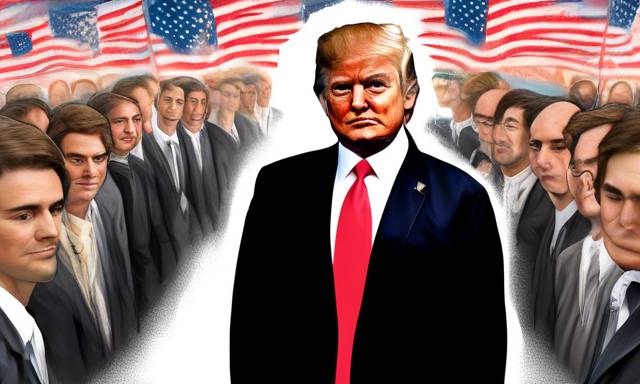What if Bitcoin’s Early Influence Could Shape Future Crypto Policies?
Imagine you’re at a coffee shop chatting about the future of cryptocurrencies, and someone brings up Ross Ulbricht. It’s a name that sparks interest, confusion, and maybe a bit of drama. As a young guy diving deep into the world of crypto, I can’t help but feel that Ulbricht’s story isn’t just about one man’s fate; it’s about the soul of the crypto movement itself. So, let’s break it down, shall we?
Key Takeaways
- Ross Ulbricht’s legacy is intertwined with Bitcoin’s rise and the Silk Road’s dark reputation.
- Former President Trump’s promise to “save” Ulbricht reignites debates on justice and cryptocurrency.
- The impact of Ulbricht’s case raises questions on decentralization and government oversight.
Alright, let’s dive in!
First off, Ross Ulbricht, the founder of the infamous Silk Road, just entered his 12th year in prison. Can you believe that? His story is a rollercoaster that has shifted many perspectives on cryptocurrencies, and it’s still causing ripples today. When Ulbricht launched Silk Road back in 2011, he effectively made Bitcoin a household name. But, of course, that came with a double-edged sword—people began to associate Bitcoin with illegal activities.
Now, here’s where it gets juicy. Recently, former President Donald Trump tweeted, “I WILL SAVE ROSS ULBRICHT!”—no pressure or anything! This shout-out isn’t just nostalgia; it’s a strategic play as he gears up for the 2024 presidential race. It opens the floodgates to discussions about how we treat online marketplaces and whether the government is overstepping its bounds. I mean, on one hand, you’ve got folks who think Ulbricht’s life sentence was way too extreme, while others see it as necessary justice for facilitating illegal sales.
The Silk Road: A Game-Changer for Bitcoin
Silk Road was groundbreaking—not just for its use of Bitcoin as the primary currency, but for how it challenged the ways we think about freedom and regulation online. Sure, it was a marketplace for all sorts of shady stuff, but it also showcased the beauty of decentralization. People could transact without middlemen, challenging the traditional banking systems that so many of us have grown to loathe.
But here’s the kicker: for all the good it did for Bitcoin, it also left an indelible stain on its reputation. Many people still view Bitcoin through the lens of Silk Road, thinking of it as “cryptocurrency for criminals.” And that could pose risks—especially as governments globally start tightening regulations.
Crypto Community Divided
Trump’s repeated vows to commute Ulbricht’s sentence have polarized the crypto community. Some view his promise as a heartfelt effort to right a wrong—after all, many libertarians see Ulbricht’s life sentence as a symbol of the battle for decentralization, even considering it an attack on the very principles that crypto stands for. Others suspect it’s a savvy political maneuver to grab votes from young, libertarian-minded individuals.
And let’s not overlook Trump’s rhetoric around other cryptocurrencies. Just a few years ago, he dissed Bitcoin, calling it a scam. Now he’s vowing to protect it against “Elizabeth Warren and her goons” at Libertarian gatherings. It’s a fascinating turn of events, and honestly, it makes me think: is he just saying what people want to hear?
Practical Tips for Investors
So, as you ponder whether to dive into the crypto waters, here are some practical tips to keep in mind:
-
Stay Informed: Following news like Trump’s statements on Ulbricht is vital. It impacts market sentiment and can affect price movements.
-
Understand the Risks: Yes, crypto holds promise, but it’s still linked to controversies, legal problems, and regulatory debates. Approach investments with caution.
-
Embrace Decentralization: Invest in projects that genuinely aim for decentralization. These are the ones that reflect the original spirit of cryptocurrencies.
-
Diversify Your Portfolio: Don’t put all your eggs in one basket, whether it’s Bitcoin or altcoins. Spread your investments to cushion against volatility.
- Get Involved: Engage with communities related to cryptocurrency. Share your insights, network, and stay connected with like-minded individuals.
Personal Insights
For me, Ulbricht’s saga is more than just a legal drama. It’s about freedom vs. control—something very close to the American spirit. There’s a deep-seated value in standing up for what’s right, even when the odds are against you. Yes, Ulbricht did make some questionable choices, but I think his story serves as a stark reminder of the delicate balance we need to strike between regulation and personal freedom.
In many ways, it reflects my own struggles to reconcile my views on crypto in an increasingly regulated world. It’s exciting, yet terrifying—kind of like riding a rollercoaster without a seatbelt!
Conclusion
So, the big question remains: what does the future hold for cryptocurrencies in light of all these debates on justice and decentralization? Will we see more figures rise from the shadows of Silk Road’s legacy, or will the weight of the law crush the ideals that many crypto enthusiasts espouse? There’s a lot at stake, and it’s a conversation that’s just getting started.
What do you think—can the crypto market emerge stronger from these narratives, or will it be forever overshadowed by its past?





 By
By
 By
By

 By
By
 By
By